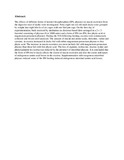| dc.contributor.author | Adeola, O. | |
| dc.contributor.author | Onyango, EM, | |
| dc.date.accessioned | 2013-06-13T07:37:54Z | |
| dc.date.available | 2013-06-13T07:37:54Z | |
| dc.date.issued | 2012 | |
| dc.identifier.citation | J Anim Physiol Anim Nutr (Berl). 2012 Jun;96(3):416-20 | en |
| dc.identifier.uri | http://www.ncbi.nlm.nih.gov/pubmed/21521382 | |
| dc.identifier.uri | http://www.ncbi.nlm.nih.gov/pubmed/21521382 | |
| dc.description.abstract | The effects of different forms of inositol hexaphosphate (IP6, phytate) on mucin excretion from the digestive tract of ducks were investigated. Forty-eight ten-wk-old male ducks were grouped by weight into eight blocks of six cages with one bird per cage. On the first day of experimentation, birds received by intubation six dextrose-based diets arranged in a 2 × 3 factorial consisting of phytase (0 or 1000 units) and a form of IP6 (no IP6, free phytic acid or magnesium-potassium phytate). During the 54 h following feeding, excreta were continuously collected and frozen until analysed. The amount of mucin and amino acids, threonine, valine and tyrosine, in excreta increased in ducks fed with either magnesium-potassium phytate or free phytic acid. The increase in mucin excretion was more in birds fed with magnesium-potassium phytate than those fed with free phytic acid. The loss of arginine, isoleucine, leucine, lysine and phenylyalanine in excreta was reduced by the presence of microbial phytase. It is concluded that the form of IP6 fed to ducks affects the extent of mucin excretion and also the extent and nature of endogenous amino acid losses in the excreta. Supplementation with exogenous microbial phytase reduced some of the IP6 feeding-induced endogenous intestinal amino acid losses. | en |
| dc.language.iso | en | en |
| dc.title | Inositol hexaphosphate increases mucin loss from the digestive tract of ducks. | en |
| dc.type | Article | en |
| local.publisher | Department of Health Sciences, East Tennessse State University, TN, USA | en |

